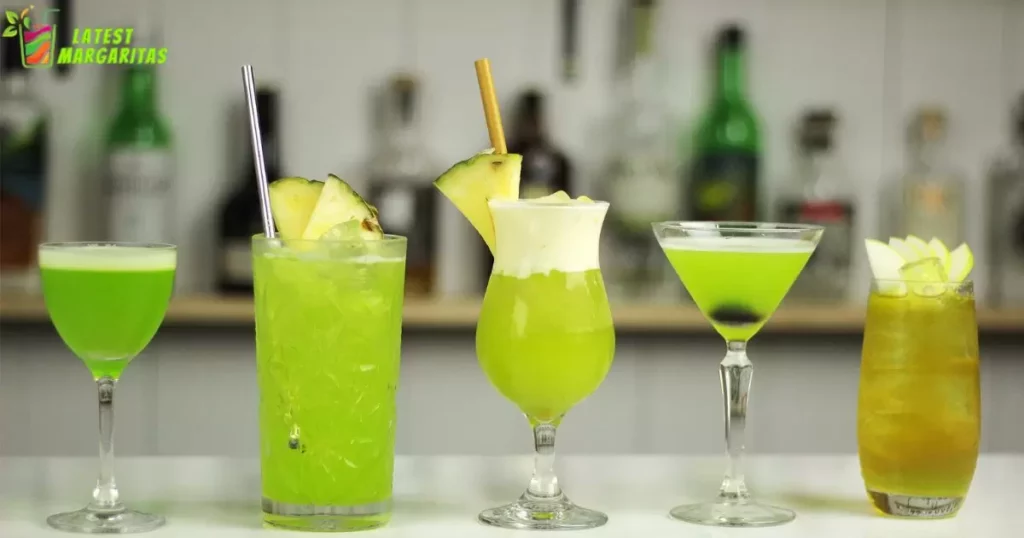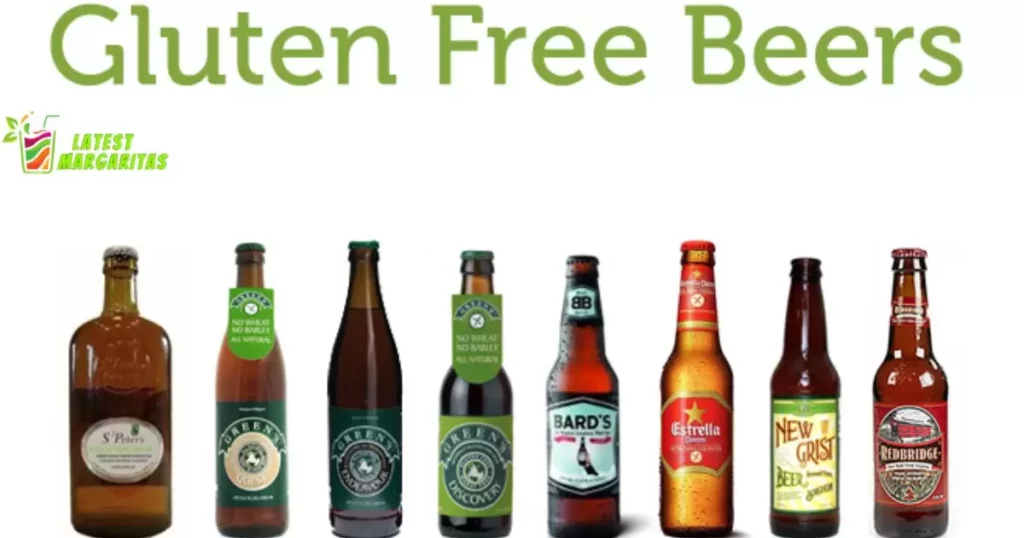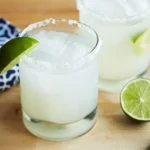Margarita mix that is labeled ‘gluten-free’ is free of any gluten-containing ingredients, making it safe for individuals with gluten sensitivities or celiac disease to enjoy without the risk of adverse reactions. These mixes typically use gluten-free flavorings and sweeteners, allowing for the creation of delicious Margaritas that meet specific dietary needs.
Margarita mix can be gluten-free, provided it’s made with gluten-free ingredients. To ensure it’s safe for individuals with gluten sensitivities or celiac disease, look for mixes that clearly state “gluten-free” on the label. Margarita mixes often include gluten, yet there are gluten-free alternatives available. It’s important to note that pure tequila, a key Margarita ingredient, is naturally gluten-free.
These gluten-free Margarita mixes typically avoid grains like wheat or barley and use alternatives like corn or agave to create a delicious, safe cocktail option for those with dietary restrictions. Always read labels and confirm gluten-free status to enjoy a worry-free Margarita.
Understanding Alcohol Content in Margaritas
Before delving into the effects of Margarita consumption, let’s clarify what a Margarita is. A Margarita is a classic cocktail that typically consists of three primary ingredients.
- Tequila
- Orange liqueur (such as Triple Sec or Cointreau)
- Lime juice
Alcohol Content in Margaritas
The alcohol content in a Margarita can vary depending on how it is prepared. Here are some key points to consider.
- Tequila Strength: The alcohol content of tequila can vary significantly. Most tequilas range from 35% to 40% alcohol by volume (ABV). Some premium tequilas may have higher ABV, while mixtos, which are a mix of agave and other sugars, can be lower in alcohol content.
- Triple Sec or Orange Liqueur: Triple Sec, a common orange liqueur used in Margaritas, typically has an ABV of around 30%. However, other orange liqueurs like Cointreau may have a higher ABV, around 40%.
- Lime Juice: Lime juice is not alcoholic and does not contribute to the cocktail’s alcohol content.
Standard Margarita Recipe
A standard Margarita recipe includes the following ingredients in the following proportions:
- 2 oz (60 ml) Tequila
- 1 oz (30 ml) Triple Sec or Cointreau
- 1 oz (30 ml) Fresh Lime Juice
This standard Margarita is typically shaken with ice and strained into a salt-rimmed glass.
Factors Influencing Alcohol Intoxication

Several factors can influence how much Margarita it takes to get drunk. It’s important to understand that alcohol affects individuals differently, and these factors play a significant role.
Body Weight and Composition
Body weight and body composition impact how alcohol is distributed in the body. Generally, a person with more body fat will have a lower tolerance than someone with more muscle mass.
Gender
Gender can influence how alcohol is metabolized. Women tend to have a higher percentage of body fat and a lower percentage of water than men, leading to a faster absorption of alcohol.
Rate of Consumption
Drinking Margaritas rapidly can lead to faster intoxication. The body metabolizes alcohol at a consistent rate, so consuming more alcohol than the liver can process can result in higher blood alcohol levels.
Food Consumption
Consuming food before drinking can slow down alcohol absorption. It’s a good practice to eat before indulging in Margaritas, as it can help mitigate the effects of alcohol.
Alcohol Tolerance
Individuals who regularly consume alcohol may have developed a higher tolerance. Over time, the body becomes more efficient at metabolizing alcohol, leading to a reduced intoxication effect.
The Role of Alcohol by Volume (ABV)
The alcohol content in Margaritas can vary based on the choice of ingredients and their respective ABV. Understanding the ABV of each component is crucial in estimating the overall alcohol content of your Margarita.
Calculating Alcohol Content in a Margarita
To estimate the ABV of your Margarita, you can use the following formula.
ABV of Margarita = (Volume of Tequila x ABV of Tequila) + (Volume of Triple Sec x ABV of Triple Sec) / Total Volume of the Cocktail
For example, using the standard Margarita recipe mentioned earlier.
ABV of Margarita = (2 oz x 40% ABV) + (1 oz x 40% ABV) / (2 oz + 1 oz) = (80 + 40) / 3 = 120 / 3 = 40% ABV
This calculation reveals that a standard Margarita has an alcohol content of approximately 40% ABV.
Alcohol Content in Margarita Variations
| Margarita Type | Tequila (oz) | Triple Sec (oz) | Lime Juice (oz) | Total Alcohol (oz) | ABV |
| Standard Margarita | 1.5 | 0.5 | 1 | 3.0 | 10-20% |
| Margarita on the Rocks | 1.5 | 0.5 | 1 | 3.0 | 10-20% |
| Frozen Margarita | 1.5 | 0.5 | 1 | 3.0 | 10-20% |
| Skinny Margarita | 1.5 | 0.5 | 1 | 3.0 | 10-20% |
| Double Margarita | 3.0 | 1.0 | 2 | 6.0 | 20-40% |
Please note that the above table provides approximate values, as the exact alcohol content can vary based on factors like tequila brand and pouring accuracy. Always drink responsibly and know your limits.
The ingredients in a classic Smoky Margarita tequila, lime juice, agave syrup, and sometimes Mezcal are generally considered gluten-free. Tequila is typically made from the fermented juice of the blue agave plant, and Mezcal is made from agave as well.
Responsible Drinking and Avoiding Intoxication
Enjoying Margaritas responsibly is essential to avoid excessive alcohol consumption and its associated risks. Here are some tips to help you maintain control while enjoying this classic cocktail:
Know Your Limits
Understand your own tolerance and know when to stop. It’s vital to listen to your body and avoid excessive drinking.
Stay Hydrated
Drinking water alongside Margaritas can help prevent dehydration and reduce the risk of getting drunk too quickly.
Avoid Shots
Taking Margarita shots can lead to rapid alcohol consumption. It’s better to sip your Margarita slowly and savor the flavors.
Plan a Safe Ride
If you plan to consume Margaritas away from home, arrange for a designated driver or a safe ride home to ensure your safety and the safety of others.
9 Types of Gluten Free Liquor
Gluten-free diets have become increasingly popular, both for individuals with celiac disease and those who are sensitive to gluten. While many alcoholic beverages are not gluten-free, there are several types of liquor that can be enjoyed without worry.
1. Tequila
Tequila, made from the fermented juice of the blue agave plant, is naturally gluten-free. Authentic tequila is made solely from agave, with no grains or additives that contain gluten. Always opt for 100% pure agave tequila to ensure it’s gluten-free.
2. Rum
Rum, a distilled alcoholic beverage made from sugarcane byproducts, is typically gluten-free. However, be cautious with flavored or spiced rums, as they may contain added ingredients that could have gluten.
3. Vodka
Many brands of vodka are distilled from grains like wheat or rye, which contain gluten. However, some vodkas are made from potatoes, grapes, or corn, making them gluten-free. Always check the label or do some research to find gluten-free vodka options.
4. Gin
Gin, a clear spirit typically flavored with botanicals, is generally gluten-free. Most gins are distilled from grains, but the distillation process removes gluten proteins. However, some specialty gins may use additives or flavorings that contain gluten, so it’s important to check the label.
5. Brandy
Brandy is a distilled wine, and most brandies are gluten-free. However, some fruit brandies or liqueurs may have added ingredients that contain gluten, so be sure to check the label for any potential gluten sources.
6. Cognac
Cognac is a type of brandy made in the Cognac region of France. Authentic cognac is made solely from grapes and is gluten-free. Be cautious with cheaper imitations that may contain additives or gluten-based flavorings.
7. Rice-Based Spirits
Rice-based spirits, such as sake and shochu, are naturally gluten-free. Sake is made from fermented rice, while shochu can be made from various ingredients, including rice, sweet potatoes, or barley. Opt for rice-based shochu to ensure it’s gluten-free.
8. Potato Vodka
Potato vodka is a safe choice for those with gluten sensitivities. It’s made from potatoes, which do not contain gluten. This type of vodka is an excellent option for those who want to enjoy a gluten-free cocktail.
9. Corn-Based Spirits
Corn-based spirits, like corn whiskey or corn-based vodka, are typically gluten-free. Corn does not contain gluten, making these options safe for individuals with gluten sensitivities. Always check the label for confirmation.
Is Beer Gluten free
No, beer is not naturally gluten-free. Most traditional beers are brewed using barley, which contains gluten. Barley is one of the primary grains used in beer production, along with wheat and rye, all of which contain gluten. There are gluten-free beer alternatives available for individuals with gluten sensitivities or celiac disease.
These gluten-free beers are typically made using grains such as sorghum, rice, corn, or gluten-free oats, which do not contain gluten. These alternative beers offer a way for people with dietary restrictions to enjoy the taste of beer without the risk of gluten-related health issues.When looking for gluten-free beer, it’s important to check labels carefully to ensure that the product is indeed gluten-free and safe for consumption.
Light Beer and Gluten
Light beer and its gluten content can be a concern for individuals with gluten sensitivities or celiac disease. Some light beers are brewed with ingredients that contain gluten, such as barley or wheat. It’s important to note that during the brewing process, some beers may undergo processes that remove or reduce gluten levels, but they may not be entirely gluten-free.
For individuals with celiac disease or gluten sensitivities, consuming light beer can pose a risk of gluten exposure and associated health issues. There are gluten-free light beer alternatives available on the market. These gluten-free light beers are typically made using gluten-free grains such as sorghum, rice, corn, or gluten-free oats.
If you have dietary restrictions related to gluten, it’s essential to read product labels carefully and choose specifically labeled gluten-free light beers. These gluten-free options provide a way to enjoy the lighter side of beer without compromising your health or dietary needs.
How to Find Gluten-Free Beer

Check the Label
The most straightforward way to identify gluten-free beer is by checking the label. Many gluten-free beers are clearly labeled as such. Look for terms like “gluten-free,” “GF,” or crafted to remove gluten. These labels indicate that the beer is safe for individuals with gluten sensitivities or celiac disease.
Read Ingredient Lists
Even if a beer is not labeled as gluten-free, examining the ingredients can provide insight. Gluten-free beers are typically made with grains like sorghum, rice, corn, or gluten-free oats. If you don’t see any of the common gluten-containing grains (barley, wheat, rye) listed, it’s a good sign that the beer may be gluten-free.
Research Brands
Some breweries specialize in producing gluten-free beers. Research gluten-free beer brands and their offerings. Popular gluten-free beer brands include Omission, New Grist, and Glutenberg, among others.
Ask at Local Retailers
Talk to staff at your local liquor store or craft beer shop. They may be knowledgeable about which beers are gluten-free and can point you in the right direction.
Check Online Retailers
Online retailers, including specialized gluten-free stores, often carry a wide selection of gluten-free beers. You can browse and order them online, ensuring a convenient and safe purchase.
Consult Gluten-Free Beer Directories
There are online directories and apps dedicated to helping people find gluten-free beers. These resources list various gluten-free beer options, their ingredients, and where to purchase them.
Ask at Bars and Restaurants
When dining out, inquire about gluten-free beer options with your server or bartender. Many establishments, especially those catering to dietary needs, offer gluten-free beers on their menus.
Join Gluten-Free Communities
Connect with online communities or forums dedicated to gluten-free living. Other individuals with gluten sensitivities often share their experiences and recommendations regarding gluten free beers.
Gluten-Free Alternatives
To be on the safe side, you can also consider the following alternatives when enjoying Margaritas at a restaurant.
BYO Margarita Mix
If you’re uncertain about the ingredients in the restaurant’s Margarita mix, a practical solution is to bring your own gluten-free Margarita mix. This alternative allows you to have full control over the ingredients and avoid potential gluten sources.
Benefits
- Assurance of gluten-free ingredients.
- Personalized Margarita preparation.
- Peace of mind regarding gluten contamination.
Considerations
- Check with the restaurant in advance if they allow outside food or beverages.
- Bring your mix in a sealed container to prevent spillage.
Opt for Tequila Shots
When in doubt about the Margarita mix’s gluten content, a straightforward option is to order a straight shot of tequila. To ensure it’s gluten-free, be sure to select tequila that is 100% agave, as this variety should not contain any potential gluten sources.
Benefits
- Minimal risk of gluten contamination.
- Quick and simple choice.
- Enjoy the pure flavor of tequila.
Considerations
- Verify with the bartender or server that the tequila is 100% agave.
- Not as flavorful as a Margarita if you prefer a mixed cocktail.
Patronize Gluten-Free-Friendly Restaurants
Research and choose restaurants that are well-known for accommodating gluten-free diets. These establishments often have clear labeling, well-trained staff, and a greater understanding of gluten-related concerns. When dining at gluten-free-friendly restaurants, you can be more confident about the safety of your Margarita.
Benefits
- Access to a menu designed for gluten-free diners.
- Staff knowledgeable about gluten sensitivities.
- Reduced risk of cross-contamination.
Considerations
- It require more planning and research to find such restaurants.
- Limited choices if the restaurant’s specialty is not Mexican cuisine.
5 Gluten free margaritas
Classic Lime Zest Margarita
This is the timeless Margarita that combines the zing of fresh lime with smooth tequila and orange liqueur. It’s a gluten-free twist on the classic favorite.
Strawberry Sunrise Margarita
A fruity and gluten-free delight, the Strawberry Sunrise Margarita combines the sweetness of ripe strawberries with the tang of citrus, all in a refreshing Margarita.
Tropical Breeze Margarita
Experience a taste of the tropics with this gluten-free Margarita. It combines the flavors of coconut, pineapple, and a hint of mango for a delightful beachy vibe.
Spicy Jalapeño Mango Margarita
For those who enjoy a little kick in their Margarita, the Spicy Jalapeño Mango Margarita offers a unique blend of sweet and spicy, with the richness of mango and the heat of jalapeño.
Blue Lagoon Margarita
This Margarita takes a creative turn with blue curaçao, giving it a vibrant blue hue. It’s a gluten-free Margarita that adds a splash of color to your cocktail experience.
FAQs
Are most margaritas gluten-free?
Most Margaritas are not naturally gluten-free due to common mix ingredients containing gluten.
Does Jose Cuervo margarita Mix have gluten?
Jose Cuervo Margarita Mix offers both gluten-free and regular versions; check the label.
Is tequila mix gluten-free?
Tequila itself is naturally gluten-free, but mix ingredients may contain gluten.
Is Lime Margarita Mix gluten-free?
Lime Margarita Mix can vary; always read the label for gluten-free options.
Conclusion
Margarita mixes offers a diverse array of options, with both gluten-containing and gluten-free alternatives available to cater to various dietary needs. It is crucial for individuals with gluten sensitivities or celiac disease to exercise caution and discernment when selecting Margarita mixes.
It’s essential to recognize that while Margarita mixes may be a potential source of gluten, the primary spirit in a Margarita, tequila, remains gluten-free. This allows for the enjoyment of this iconic cocktail while staying true to dietary restrictions.
In the world of Margaritas, knowledge, and discernment are key. By making informed choices and paying attention to labels and ingredients, one can relish the delightful flavors of this classic cocktail safely and responsibly, making every Margarita experience a truly enjoyable one.





